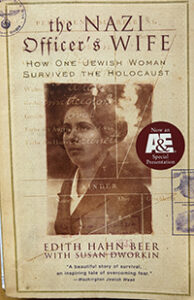The Nazi Officer’s Wife: How One Woman Survived the Holocaust by Edith Hahn Behr; William Morris (c) 1999.
By Dorothea Shefer-Vanson

 MEVASSERET ZION, Israel — This is the incredible story of a young Jewish woman who managed to survive as a ‘U-boat’ or submarine, i.e., someone ‘hidden in full view,’ during the Holocaust. The ability to assume the identity of a non-Jew and thus to live as a member of the wider society of Gentiles (Aryans) at a time when Nazi ideology condemned all Jews to death depended on gaining the help, support and cooperation of a number of people, both Jews and non-Jews, as well as on the individual’s ability to transcend the ever-present fear of detection and present a false face to the world.
MEVASSERET ZION, Israel — This is the incredible story of a young Jewish woman who managed to survive as a ‘U-boat’ or submarine, i.e., someone ‘hidden in full view,’ during the Holocaust. The ability to assume the identity of a non-Jew and thus to live as a member of the wider society of Gentiles (Aryans) at a time when Nazi ideology condemned all Jews to death depended on gaining the help, support and cooperation of a number of people, both Jews and non-Jews, as well as on the individual’s ability to transcend the ever-present fear of detection and present a false face to the world.
Edith Hahn grew up in pre-war Vienna and was accustomed to living a comfortable life, enjoying the cultural and social benefits of the Austrian capital. She had overcome her father’s resistance to her registration as a student at the university and was near completion of her law studies when Austria became part of Germany with the Anschluss of 1938. As Nazi control of the city tightened, Edith and her parents were forced to leave their comfortable home and move into a smaller apartment, and eventually to the ghetto where Vienna’s Jews were confined. Edith was forcibly conscripted to a labor camp and sent to work on a farm harvesting asparagus and other vegetables, living under difficult conditions, and separated from her parents, sisters and friends, though she managed to correspond with them. After her two sisters were able to get to England and Palestine respectively, and her father had suddenly died from natural causes her mother was left alone in Vienna, but continued to send Edith occasional packages with food and/or clothes.
When the labor camp was dissolved Edith returned to Vienna, where she was given advice by a friend who was familiar with the way the Nazi bureaucracy worked. As a result, Edith managed to obtain the documents of a Gentile friend and assume her identity, and thus was able to avoid being sent to a concentration camp as were her mother and all the Jews of Vienna. On an impulse, Edith decided to go to the town of Munich, where she managed to start her new life, first as a seamstress and later as an orderly or nursing assistant in a Red Cross hospital just outside the town.
Visiting an art exhibition after work one day she fell into conversation with a handsome stranger, who eventually declared his love for her and proposed marriage. She accepted reluctantly and revealed her true identity to him. He persisted with his desire to marry her, and she consented in the knowledge that she would have to be obedient and submissive, performing the role of the traditional German housewife. She managed to do this throughout the period of the war, and even to get pregnant and have a child by her husband, who worked painting planes in an aeronautics factory but was eventually conscripted into the German army as the Nazi war machine conscripted ever-more unsuitable men and boys. Eventually Edith’s husband was captured by the Russians and sent to Siberia, where he remained until the end of the war.
After the war, under Russian occupation, Edith revealed her true identity and was appointed a judge in the Munich legal system. She managed to get her husband released from Siberia, but their relations were not as they had formerly been, and they eventually divorced. By a supreme effort, Edith managed to leave Germany and emigrate with her daughter first to England and then to Israel, where she finally could feel at home.
*
Dorothea Shefer-Vanson is an author and freelance writer based in the Jerusalem suburb of Mevasseret Zion, Israel.
Editor’s Note: Originally written in 1999, The Nazi Officer’s Wife remains fascinating reading today. In 2003, it was made into a movie and in 2009, the year Edith Hahn-Beer died, it was reissued in book form.